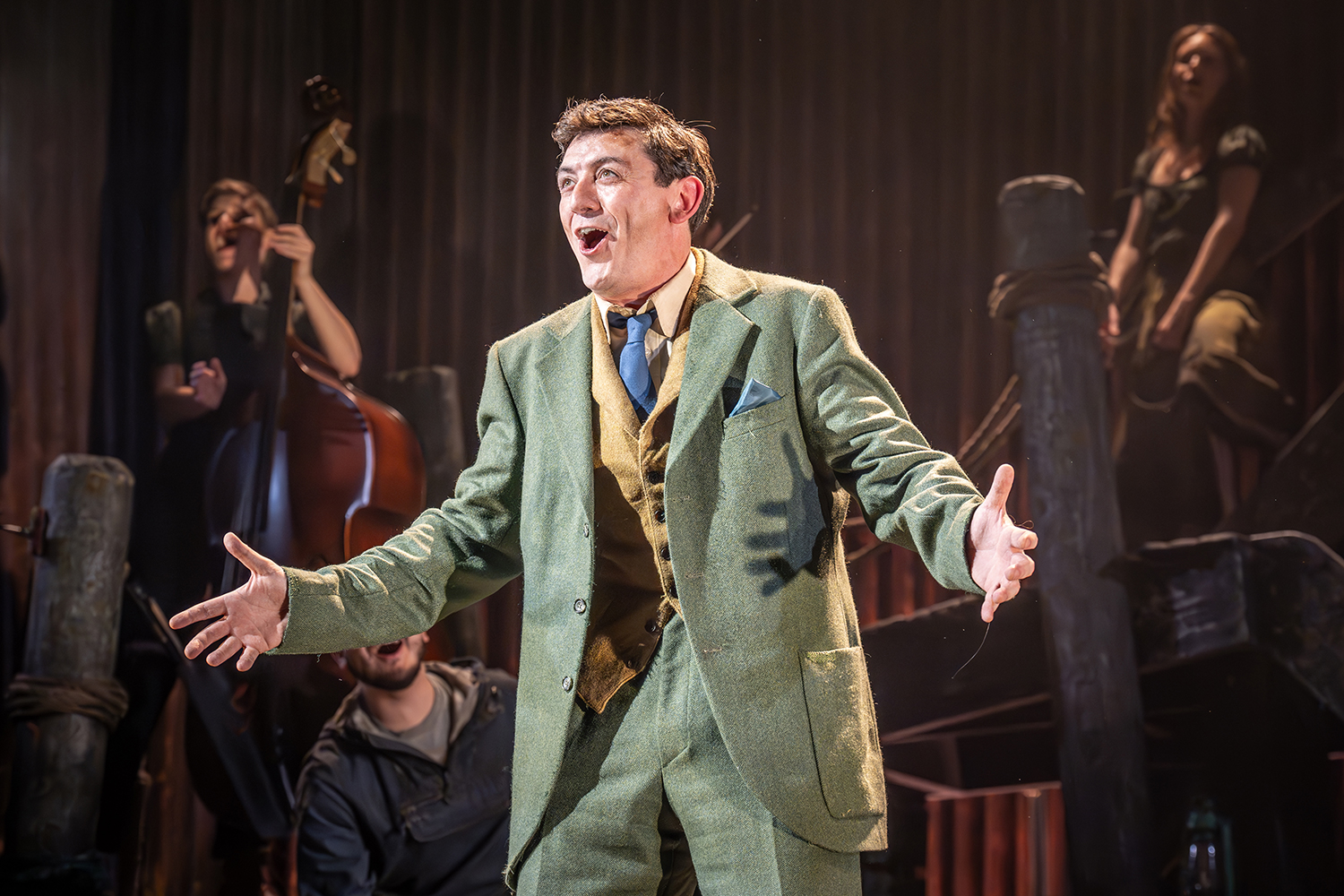The Curious Case of Benjamin Button carries a strap-line, ‘an unordinary musical’. Perhaps the word ‘extraordinary’ is simply too banal to capture the outstanding qualities of this unique show.
The year is 1918 and a miraculous birth occurs in a remote Cornish fishing village. The newborn is not a baby but an adult pensioner, Benjamin, who emerges from the womb wearing a three-piece suit, a pair of spectacles and a bowler hat. His shame-faced mother hastens away from the family home and takes a walk along the cliffs, which results in her death. Suicide, perhaps. And Benjamin’s angry father locks him in the attic and refuses to let him out. Benjamin escapes and visits the local pub where he enjoys a single pint of ale every Friday night for the next four years.
Benjamin’s handicap makes his life easier as time passes. For a dramatist, that’s unhelpful
It transpires that Benjamin is doomed to live his life in reverse, growing younger while those around him age. And for some reason, his father conceals this awkward fact from the rest of the village. Only the midwife knows the truth but she fails to share the information with her hot-headed daughter who works in the pub and adores older men. She and Benjamin start a romance but even then the midwife says nothing about Benjamin’s condition. The story is full of puzzles and difficulties like this.
Benjamin’s handicap makes his life easier as time passes and the pressure on him relaxes rather than intensifying. For a dramatist, that’s unhelpful. To solve this problem the writer, Jethro Compton, throws in a lot of external shocks: mysterious illnesses, unexplained drownings, the outbreak of war in 1939, the D-Day landings and so on.
The other difficulty is Benjamin’s flaccid, drippy personality. He has no dramatic ambition and he never does anything unless prompted by another character. He floats though each scene like an empty bin-liner stuck on a brackish pond. When the flirty barmaid chats him up, he spouts a load of impenetrable nonsense about the surface of the moon. Somehow their frigid and uninteresting romance blossoms into marriage and children. And eventually, Benjamin finds himself younger than his own kids. But the costumes don’t reflect this chronological reversal. The hapless actor, John Dagleish, wears the same hairdo all the way through. His pudgy face remains unchanged. And he plays Benjamin as a 15-year-old lad wearing the three-piece suit in which he was born.
The actors, who double as musicians, play their instruments on stage and sing all the melodies. But each number feels like a dull classic by an Irish pub band. Violins, flutes and guitars are accompanied by a thumping piano. Nothing new here. And the acting belongs to the peek-a-boo school, where every gesture is simplistic and exaggerated. Having said that, the show seemed to
delight the crowd, who whooped and cheered at the end.
Plays without an interval are often rambling and ill-constructed. Barcelona by Bess Wohl is a two-hander that opens with a drunken couple bursting into a flat at midnight and preparing for a bout of wild sex. Earlier that evening they had met by chance at a Barcelona nightclub. Irene is a frisky American blonde who spotted Manuel drinking alone and abandoned a rowdy hen party to chat him up. His bachelor pad seems oddly unloved and cheerless and he explains that the building is due to be flattened. This admission hides a much darker secret. Instead of leaping into bed together, the couple share a bottle of Rioja and open up about their lives.
The first bombshell lands. Irene reveals that the hen party is her own and that she’s due to fly home to Denver to marry her stuffy, ultra-conservative boyfriend. Rather than take advantage of her, Manuel urges her to phone the boyfriend and explain her reluctance to marry him. As they solve this problem another bombshell arrives. Irene learns that Manuel has suffered a bereavement and feels that his existence is pointless. She sees that her mission is to save him just as he saved her.
The plot sounds heavy-handed but it unfolds at a satisfying pace, with the story swerving every 15 minutes like in a film. The lack of an interval helps to crank up the tension. Is it formulaic? Slightly. And some critics have condemned it as shallow, melodramatic and predictable. But on its own terms, it’s a thumping success. Lily Collins is great value as the slightly irritating American sex bomb. Alvaro Morte has an easy time playing a brooding hunk with a tortured past. The pair work well together and their physical attraction seems all too believable.
Don’t give this show a hard time. Sit back and let it work its magic and you’ll enjoy an hour and a half of delicious escapism. A Broadway transfer seems inevitable. That’s where it belongs.








Comments